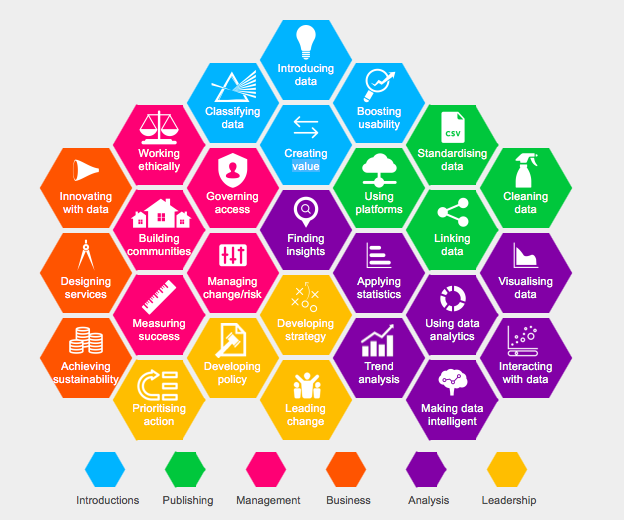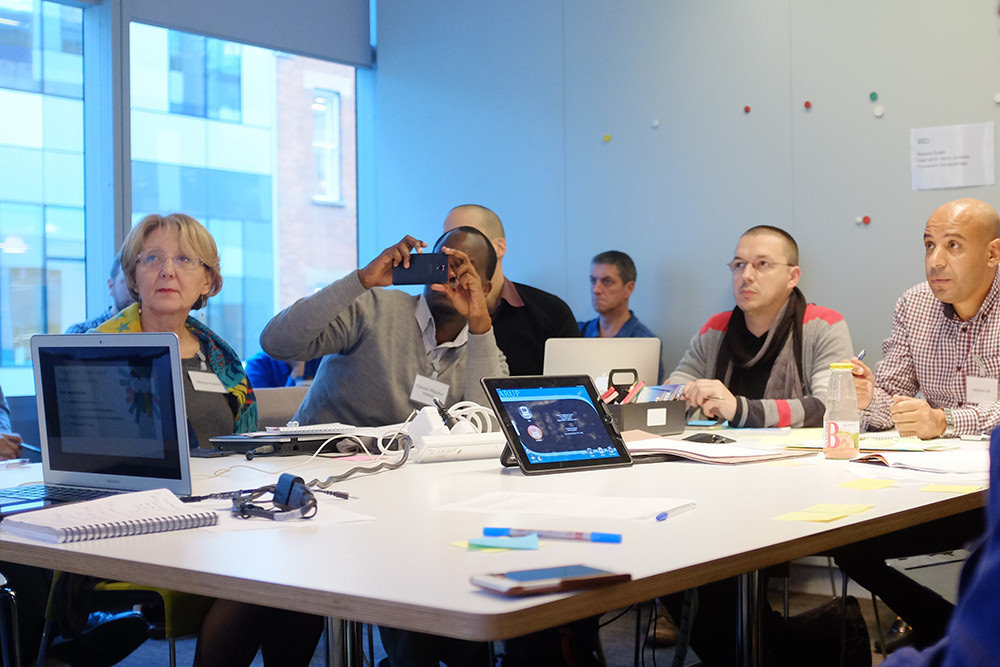As your business becomes more data-driven, to make real progress you will be reliant on the capacity of both your internal organisation and your external network. If you’re a leader in your sector this reliance might mean working to ensure your network has the right skills. Which means adopting a structured approach to understanding what’s needed.
Sainsbury’s, a leading UK supermarket chain, relies on a complex chain of suppliers and internal teams to get the right products to consumers in an efficient way. Being able to analyse, understand and improve this supply chain requires data, which means that their data infrastructure, like their physical supply chain, extends well beyond their organisation.
Data infrastructure isn’t just about computers, wires and database technology. It’s about the standards, processes, and, most importantly, the data and the people who work with that data. That’s why Sainsbury’s has invested in learning programmes that build data-literate leaders across both its business and its key suppliers, bringing them together for training and mentoring workshops, and supporting them with specially designed online content. By investing in leadership data skills and focusing on collaborative problem solving, Sainsbury’s is taking an active role in ensuring that the crucial components of its data infrastructure have what they need to take advantage of data.
Similarly, many businesses who develop and sell complex data products and services find themselves having to upskill buyers, particularly if their target markets are in sectors relatively new to digital approaches to making decisions and running services. This is why we have worked with organisations like data science specialists Mastodon C to develop assets like this data glossary for leaders as part of broader education and marketing efforts.

If data is truly to have a useful impact in your work then more people in your network will need to be data literate. That means having a fundamental understanding of the role that data plays in their work, how they interact with it, and the impact it can have. You’ll then need a mix of people with practical data skills, including the specialisms most commonly associated with data like data science and data visualisation, along with skills such as innovation, ethics, and compliance.
This concept isn’t new. As software became common in the workplace, tech companies like Microsoft, Cisco and Oracle invested heavily in building both the skills of their customers and the capacity of their networks of channel partners, consultants, and vendors.
But how do you go about breaking down a complex set of needs across complex networks?
Use a framework to analyse data skills
Data is a broad domain, where much of the recent discussion about skills has focused on analytics and advanced technologies. But tech is only part of the picture. Organisations need to create value from data, whilst avoiding harmful impacts. This requires a much broader set of skills – from ethics to innovation, from governance to strategy. Furthermore, these skills won’t be found in single people or teams. They are needed right across an organisation and it’s network.
This is a potentially complex picture which is why, whilst at the Open Data Institute, I led the development of the first versions of a skills framework that breaks the big picture down, into distinct topics.

The framework shows how different skills depend on each other and, together, contribute to building value by action, change, and better decisions. It’s rare for a company to either have all the skills it needs in-house. Which is why most organisations need to ensure they have ready access to capability across the framework.
The technology investment trap
The tendency has been to focus on the right-hand side of the framework through investments in data technology and technical data skills. That leads us to an uncomfortable truth. According to Gartner 85% of data projects fail. Without the capacity to innovate, build sustainable products and lead change across an organisation it’s virtually impossible to reap the benefits of data.
That’s why it’s important to map which areas are essential to getting value from data and where the gaps might be. This will require identifying current capacity, and comparing that to the skills you require.

It’s a complex exercise but an important one. Gaps in data capacity can be filled through training, acquisitions, partnerships, and procurement. This should be a strategic process, which is what makes the framework a useful tool for thinking more holistically. Rather than throwing money at magic technology or building capacity where it’s not needed, a framework based approach considers how all the elements interact to generate value. A framework uncovers unexpected places where investment might yield better longer-term value.
Data literate leaders build culture through networks
Which brings us back to investing in the skills of your wider network. Considering the needs of your network, then building capacity, has the potential to be a powerful investment. Not only will you satisfy your need to develop a data infrastructure your business can thrive on, but you’ll be building goodwill across clients and partners.
This network-based approach is a feature of organisations with a strong data culture. Investments in tech and skills are the most common strategic decisions businesses make around data. But, for data technologies and skilled people to thrive and make an impact they need the right environment. This requires an organisational culture ready to take advantage of the opportunities data offers. By thinking beyond their normal boundaries, data-literate leaders are both taking care of the skills of others and modeling the data culture and creative mindset businesses and their wider networks need.




